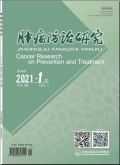肿瘤防治研究2024,Vol.51Issue(3):203-209,7.DOI:10.3971/j.issn.1000-8578.2024.23.0878
非小细胞肺癌肝转移免疫微环境研究进展及治疗策略
Treatment Strategy and Research Progress of Immune Microenvironment for Liver Metastasis of Non-small Cell Lung Cancer
摘要
Abstract
Liver is the common site for metastasis and spread of non-small cell lung cancer(NSCLC).Lung cancer patients with liver metastasis have poor prognosis,which may be related to liver-specific microenvironment composition.The metastasis of lung cancer to the liver is regulated by various pathophysiological factors,including the liver immune microenvironment,related cells,proteins,signaling molecules,and gene changes.These factors will affect the consistent disease process and subsequent treatment strategies.Immune checkpoint inhibitors(ICIs)have made breakthroughs in treatment of patients with advanced NSCLC.However,NSCLC patients with liver metastasis,a unique population of advanced lung cancer,are characterized by poor immunotherapeutic effect.This paper reviews the related mechanisms of the immune microenvironment in affecting the occurrence and development of liver metastases and summarizes the achievements and prospects of anti-tumor immunotherapy in liver metastases of NSCLC.关键词
非小细胞肺癌/肝转移/免疫治疗/免疫微环境Key words
Non-small cell lung cancer/Liver metastasis/Immunotherapy/Immune microenvironment分类
医药卫生引用本文复制引用
孙家齐,王玉栋..非小细胞肺癌肝转移免疫微环境研究进展及治疗策略[J].肿瘤防治研究,2024,51(3):203-209,7.基金项目
S&T Program of Hebei(No.236Z7729G) (No.236Z7729G)
Natural Science Foundation of Hebei Province(No.H2020206551) (No.H2020206551)
Beijing Xisike Clinical Oncology Research Foundation(No.Y-MSDPU2021-0202) 河北省科技厅项目(236Z7729G) (No.Y-MSDPU2021-0202)
河北省自然科学基金(H2020206551) (H2020206551)
北京市希思科临床肿瘤学研究基金(Y-MSDPU2021-0202) (Y-MSDPU2021-0202)

